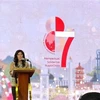The second group of the Association of Southeast Asian Nations (ASEAN) science fellowships was announced by the ASEAN Committee on Science and Technology on May 4.
The goal is to further promote policymaking and data-based resolutions to address some of the region’s most challenging development issues.
Some 14 early-career scientists from Cambodia, Indonesia, Malaysia, Myanmar, the Philippines, Thailand and Vietnam were selected through a highly competitive process. The programme has been supported by the US Agency for International Development (USAID) for the second consecutive year.
According to US Ambassador to ASEAN Nina Hachigian, the fellowship provides unparalleled opportunities for scientists to explore applying science in policymaking. Science and technology are critical to solving policy problems, she added.
Director of the Cross-Sector Cooperation Directorate and ASEAN Secretariat Larry Maramis said the ASEAN is interested in strengthening and promoting the use of science in policymaking across food and energy security, biodiversity, climate change and disaster management.
She noted the fellowship can build scientist capacity within the region to take a more prominent role in their respective country’s integration into the ASEAN Community.
Starting next week, the fellows will be placed in host ministries in their own countries for one year to contribute their expertise in the fields of biodiversity, energy security and fisheries and coastal management.
The programme’s long term goal is to create a network of scientists across the bloc who will not only serve as champions for greater interaction between scientists and policymakers, but also contribute to the development of policies that positively impact the lives of ASEAN citizens.-VNA
The goal is to further promote policymaking and data-based resolutions to address some of the region’s most challenging development issues.
Some 14 early-career scientists from Cambodia, Indonesia, Malaysia, Myanmar, the Philippines, Thailand and Vietnam were selected through a highly competitive process. The programme has been supported by the US Agency for International Development (USAID) for the second consecutive year.
According to US Ambassador to ASEAN Nina Hachigian, the fellowship provides unparalleled opportunities for scientists to explore applying science in policymaking. Science and technology are critical to solving policy problems, she added.
Director of the Cross-Sector Cooperation Directorate and ASEAN Secretariat Larry Maramis said the ASEAN is interested in strengthening and promoting the use of science in policymaking across food and energy security, biodiversity, climate change and disaster management.
She noted the fellowship can build scientist capacity within the region to take a more prominent role in their respective country’s integration into the ASEAN Community.
Starting next week, the fellows will be placed in host ministries in their own countries for one year to contribute their expertise in the fields of biodiversity, energy security and fisheries and coastal management.
The programme’s long term goal is to create a network of scientists across the bloc who will not only serve as champions for greater interaction between scientists and policymakers, but also contribute to the development of policies that positively impact the lives of ASEAN citizens.-VNA



















